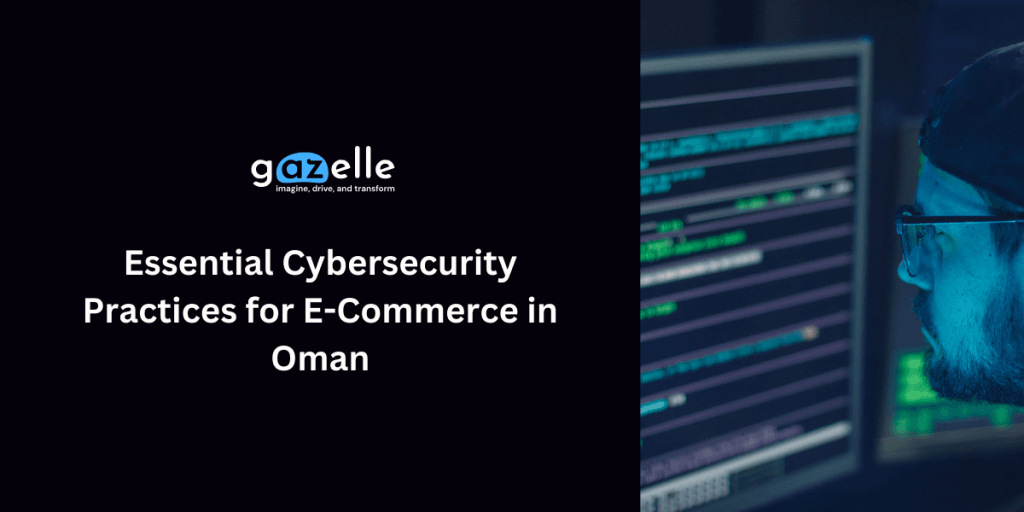In the rapidly evolving landscape of e-commerce, ensuring cybersecurity is paramount, especially for online businesses in Oman. As digital transactions increase, so do the threats from cybercriminals. This article delves into essential cybersecurity practices tailored for e-commerce businesses in Oman, highlighting key strategies to protect your online store and customer data.
Introduction Cybersecurity E-Commerce Practices in Oman
With the boom in e-commerce, Oman has seen a significant rise in online transactions. However, this growth comes with an increased risk of cyber threats. For e-commerce businesses, securing online transactions and customer data is critical. Implementing robust cybersecurity measures not only protects your business but also builds customer trust and loyalty.
1. Implement Strong Password Policies
A strong password policy is a fundamental step in cybersecurity. Encourage customers and employees to use complex passwords that combine letters, numbers, and special characters. Regularly update passwords and avoid reusing them across different platforms.
- Two-Factor Authentication (2FA): Enforce 2FA to add an extra layer of security. This ensures that even if a password is compromised, unauthorized access is prevented.
2. Secure Your Website with HTTPS
Securing your e-commerce website with HTTPS is crucial. HTTPS encrypts data transferred between the user’s browser and your website, preventing interception by hackers.
- SSL Certificates: Obtain an SSL certificate for your website. This not only secures data but also boosts your search engine ranking as Google prioritizes secure websites.
3. Regularly Update Software and Systems
Keeping your software and systems up to date is vital in defending against cyber threats. Regular updates patch vulnerabilities and enhance security.
- Automated Updates: Enable automated updates for your e-commerce platform, plugins, and other software to ensure you are always protected against the latest threats.
4. Use Secure Payment Gateways
Payment gateways are the lifeblood of any e-commerce business. Using secure and reputable payment gateways ensures the safety of your customers’ financial information.
- PCI DSS Compliance: Ensure that your payment gateway complies with the Payment Card Industry Data Security Standard (PCI DSS) to safeguard credit card transactions.
5. Protect Against Malware and Viruses
Malware and viruses can compromise your e-commerce website, leading to data breaches and financial loss. Implement robust anti-malware solutions to protect your site.
- Regular Scans: Conduct regular malware scans and remove any detected threats promptly.
- Firewalls and Anti-Virus Software: Use firewalls and anti-virus software to provide an additional layer of defense.
6. Educate Your Staff and Customers
Education is a powerful tool in cybersecurity. Training your staff and informing your customers about cyber threats can significantly reduce the risk of attacks.
- Employee Training: Conduct regular cybersecurity training sessions for your employees to keep them informed about the latest threats and best practices.
- Customer Awareness: Provide resources and information to help customers recognize and avoid phishing scams and other cyber threats.
7. Backup Data Regularly
Regular data backups are essential for recovering from cyber attacks. Ensure that backups are stored securely and are accessible when needed.
- Automated Backups: Implement automated backup solutions to ensure that your data is backed up regularly without manual intervention.
- Offsite Storage: Store backups offsite or in the cloud to protect against physical threats like fire or theft.
8. Monitor and Respond to Security Incidents
Continuous monitoring and a robust response plan are crucial for managing cybersecurity incidents. Implement systems to detect and respond to threats in real-time.
- Intrusion Detection Systems (IDS): Use IDS to monitor network traffic and detect suspicious activity.
- Incident Response Plan: Develop and regularly update an incident response plan to ensure a swift and effective response to security breaches.
Conclusion
Implementing these essential cybersecurity practices will help protect your e-commerce business in Oman from the growing threats in the digital landscape. By securing your website, using strong passwords, educating your staff and customers, and continuously monitoring for threats, you can create a safe and trustworthy online shopping environment.
For more tips and services to enhance your e-commerce security, visit GazelleTec.






